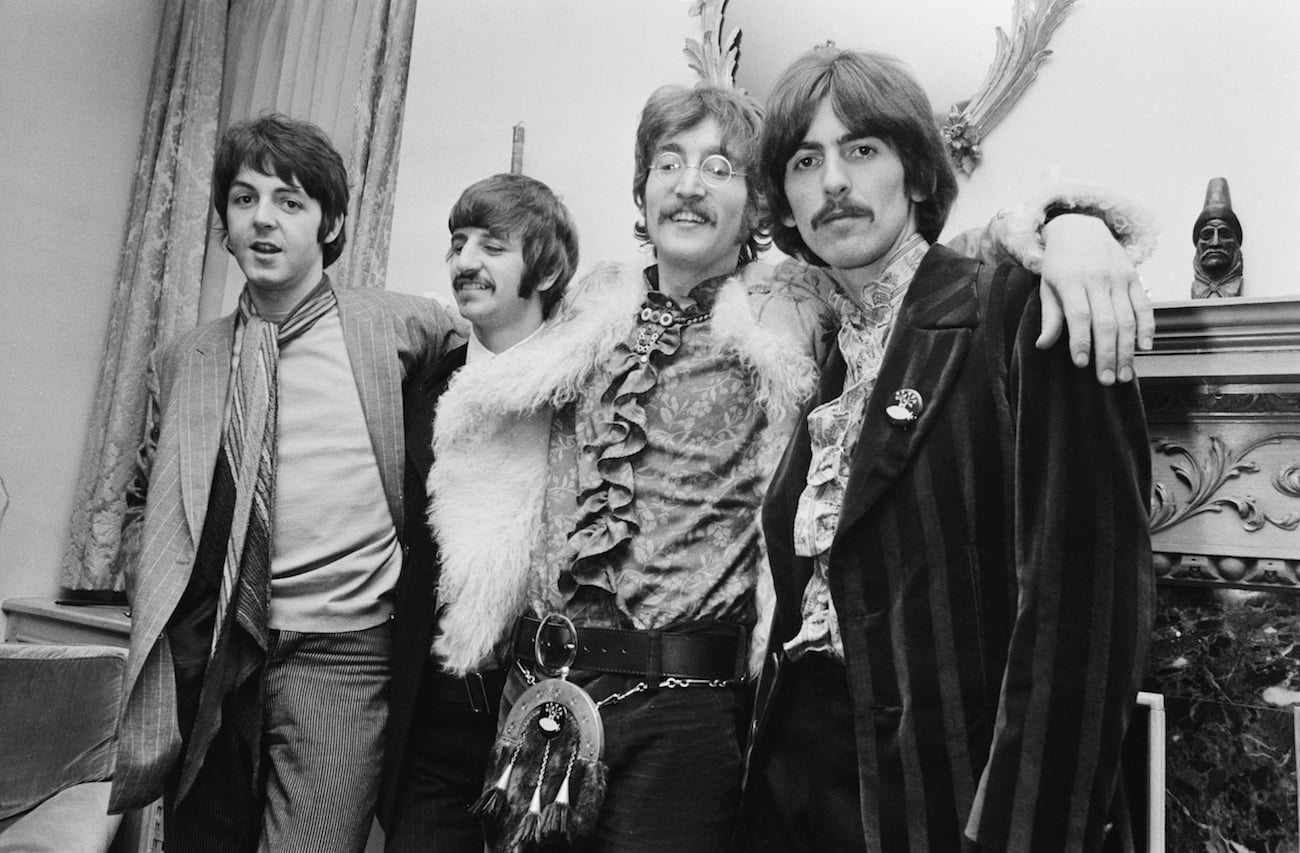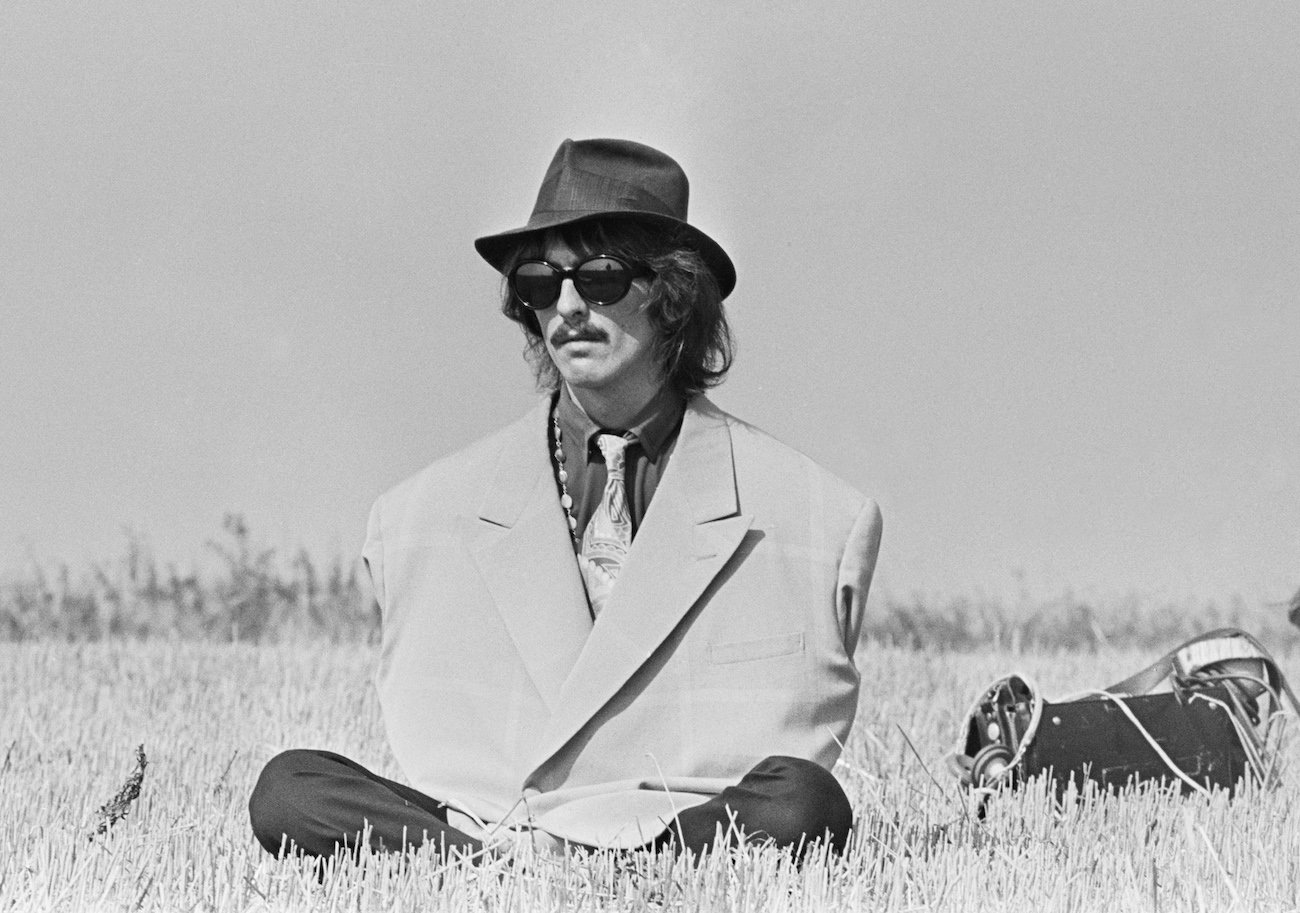
George Harrison’s ‘Within You Without You’ Is a Special Beatles Song for 3 Reasons
For several reasons, George Harrison‘s “Within You Without You” is a special Beatles song. The spiritual Beatle almost didn’t write the song during the making of Sgt. Pepper’s Lonely Hearts Club Band.

George Harrison wrote ‘Within You Without You’ after The Beatles’ producer rejected his first choice for ‘Sgt. Pepper’
Paul McCartney and John Lennon often cast George and his songs aside. The Beatles’ producer, George Martin, wasn’t any better. He also never supported George. In his book, Summer of Love: The Making of Sgt. Pepper, Martin wrote George brought him a song. He couldn’t help but wonder if it was “going to be any better than the last one.”
George brought forth “It’s Only A Northern Song.” Martin wrote, “I groaned inside when I heard it. We did make a recording of it on 14 February, but I knew it was never going to make it.
“I had to tell George that as far as ‘Pepper’ was concerned, I did not think his song would be good enough for what was shaping up as a really strong album. I suggested he come up with something a bit better. George was a bit bruised: it is never pleasant being rejected, even if you are friendly with the person who is doing the rejecting. (‘It’s Only A Northern Song’ did see the light of day in the end, on ‘Yellow Submarine’).”
George pulled it together despite the rejection and wrote “Within You Without You.” In his 1980 memoir, I Me Mine, George wrote that the song came about after learning about meditation. “We had entered into the ‘All You Need Is Love’ consciousness after the LSD period,” George wrote.
“The song was written at Klaus Voormann’s house in Hampstead, London, one night after dinner. I was playing a pedal harmonium in the house, when the song came to me. The tune came first, then the first sentence …. we were talking … I finished the words later.
“This was during the ‘Sgt. Pepper’ period, and after I had been taking sitar lessons with Ravi Shankar for some time, so I was getting a bit better on the instrument. I was continually playing Indian music exercises, the melodies of which are called Sargams, which are the bases of the different Ragas. That’s why around this time I couldn’t help writing tunes like this which were based upon unusual scales.
“The best part of it for me is the instrumental solo in the middle which is in five/four time–the first of the strange rhythm cycles that I caught on to one-two; one-two-three; one-two-one-two-three.”
When George showed the song to Martin, the producer was relieved. “This song was really different; and although George had experimented with Indian music quite a bit before ‘Sgt. Pepper’ – the sitar in ‘Norwegian Wood’ springs to mind – this was the first time he’d devoted an entire track to his obsession.”
The first time George dedicated a song to Indian spirituality was “Love You To.” However, Martin was right; “Within You Without You” was different.
Why ‘Within You Without You’ is a special Beatles song
Martin wrote that “Within You Without You” “was nothing whatsoever like anything John or Paul could have come up with, and in that lay much of its appeal for me. I still didn’t think of it as a great song, though (many now do!). The tune struck me as being a little bit of a dirge; but I found what George wanted to do with the song fascinating.”
Everything about the song was fascinating. “Within You Without You” is a special Beatles song firstly because it’s the longest song on Sgt. Pepper. Secondly, it’s one of the most complex Beatles songs ever. It involves three changes of time signature, “something never done before on a Beatles song,” Joshua M. Greene wrote in Here Comes The Sun: The Spiritual And Musical Journey Of George Harrison.
“Within You Without You” is also the only song on the album “in which only one Beatle performed; this was George’s accomplishment and his alone,” Greene continued.
Martin wrote, “It was cosmically different – weird! The lyrics touched on what you might call the metaphysical: the inner meaning of life, and all that kind of thing. And it was deeply anti-establishment.
“‘Within You Without You’, like Paul’s ‘She’s Leaving Home’ and ‘Yesterday, was a distinctly solo effort. Looking back, these one-offs were early signs of the group’s disintegration.
“When he first played it to me on his acoustic guitar, George made rather a mournful sound: but I was intrigued. He had a host of Indian musicians who were friends of his, some of whom he called in to play a guide rhythm track with him. George loved working with these musicians, and it was fascinating to see how his ideas grew, and how easily he communicated the complex music to them.
“Indian rhythms can be extraordinarily difficult, and I have a fond memory of George speaking in a strange tongue, emphasizing the accents with a wag of his head – ‘Ta-ta ticky ta, ticky tick ta ta’ and so on. The Indian musicians cottoned on instantly. It was most impressive.”
The spiritual song had a tremendous impact on Western music, even though George was critical of it
During a 1979 interview with Rolling Stone, George revealed he didn’t think much of “Within You Without You.”
“‘Within You, Without You’ was just me and some Indian musicians in the studio by ourselves,” he said. “It sounds a bit dopey now in retrospect, except the sitar solo’s good.”
Despite his harsh views, the song had a tremendous impact on Western music. Greene wrote that it was “a remarkable microcosm of Indian music and philosophy” and “became many people’s first meaningful contact with meditative sound.”
Juan Mascaro, a professor of Sanskrit at Cambridge University, heard the song. He wrote George saying, “it is a moving song and may it move the souls of millions; and there is more to come, as you are only beginning on the great journey.”
Martin continued, “There is pop music in India, of course, as there is anywhere else; it tends to be film sound-track music. There is also a rich tradition of folk music in the sub-continent, and north and south Indian classical music, each with its own further subdivisions.
“George had looked into all this pretty thoroughly, and had homed in on Hindustani north Indian classical music as the thing that appealed to him most. This was one of the most ancient forms of music in the world, he told me, mentioned in India’s ancient Vedic literature.
“What really appealed to George was the sound – the unique sound the instruments made when used in this very ancient tradition. In some mystical way, he told me, he recognized that sound; it was as if he had heard it before.”
“Within You Without You” is an important Beatles song, but it’s also an essential part of music beyond the band.


